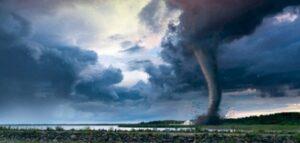In a stark demonstration of the escalating impact of climate change, natural disasters have inflicted an estimated $310 billion in economic losses worldwide in 2024, marking a 6% increase from the previous year, according to reinsurance giant Swiss Re. The company’s latest report underscores the deepening crisis as urban value concentration and rising rebuilding costs amplify the financial toll of such events.
Insured losses have surged by 17% year-on-year, reaching $135 billion, with hurricanes Helene and Milton significantly contributing to these costs. This marks the fifth consecutive year that insured losses have exceeded $100 billion, highlighting an alarming trend in the insurance industry.
“Much of this increasing loss burden results from value concentration in urban areas, economic growth, and increasing rebuilding costs,” said Balz Grollimund, Swiss Re’s head of catastrophe and perils. The report emphasizes the exacerbating role of climate change, with 2024 poised to be the hottest year on record.
Flooding has emerged as a particularly costly peril, with intense events in Europe and the United Arab Emirates alone costing insurers $13 billion. This year ranks as the third-costliest for floods globally and the second-costliest for Europe.
The United States bore the brunt of insured losses, particularly due to hurricanes Helene and Milton, which struck the southeast in late September and early October, resulting in nearly $50 billion in insured damages. Severe thunderstorms further compounded losses, making the U.S. account for at least two-thirds of the total global insured losses for 2024.
Experts warn of increasing financial risks as the climate crisis intensifies. According to the World Meteorological Organization, extreme weather events are expected to become more frequent and severe, necessitating urgent action to mitigate impacts and enhance resilience.
Swiss Re’s findings serve as a potent reminder of the urgent need for comprehensive strategies to address the mounting challenges posed by climate change, as the frequency and severity of natural disasters continue to rise global



